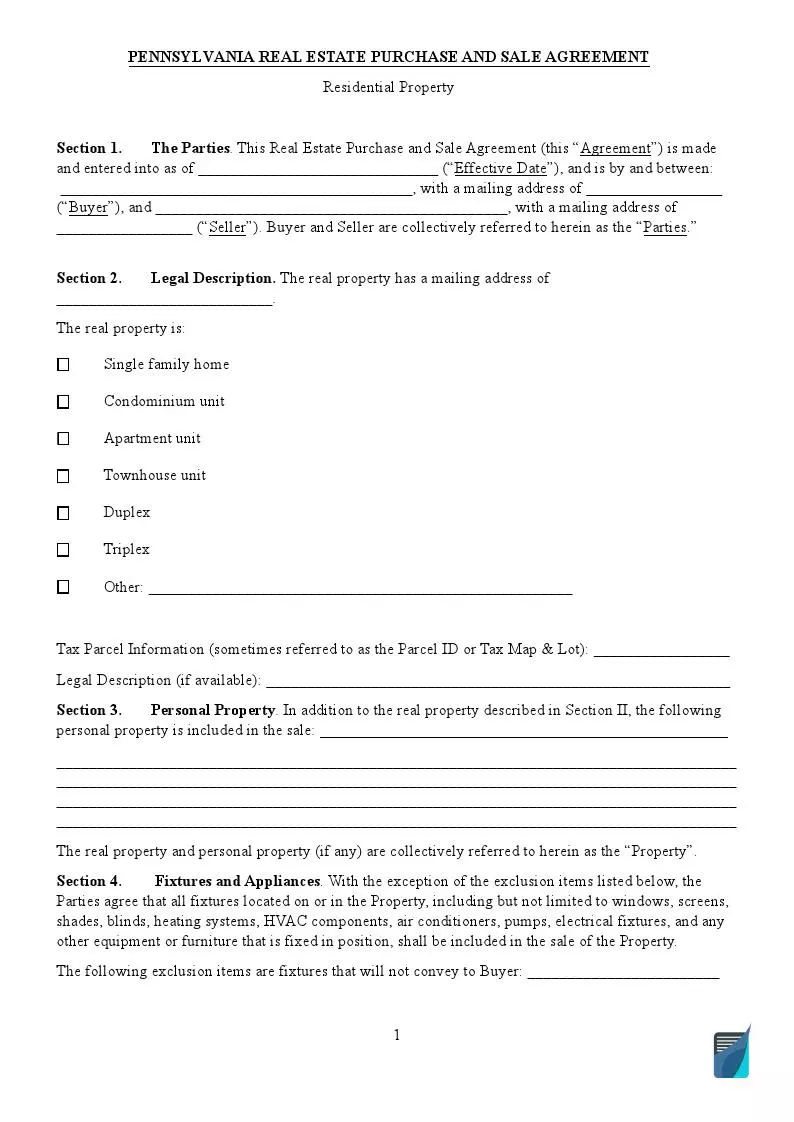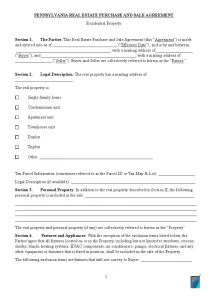Pennsylvania Real Estate Purchase Contract
The Pennsylvania real estate purchase agreement is a legal form completed and countersigned by the seller and the buyer concerning acquiring a particular residential or commercial property on mutually beneficial conditions. This document’s content and conditions are defined and negotiated by both parties.
The conditions typically cover several critical details regarding the deal, such as information related to the seller and buyer (names, addresses, and other personal data), property description and address, closing costs, and purchase details.

Build Your Document
Answer a few simple questions to make your document in minutes
Save and Print
Save progress and finish on any device, download and print anytime
Sign and Use
Your valid, lawyer-approved document is ready
Pennsylvania Residential Purchase and Sale Agreement
This printable purchase and sale agreement covers various types of properties, including:
- Single-family homes
- Condominiums
- Planned unit development
- Duplex
- Triplex
- Other types of property
The real estate purchase agreement in Pennsylvania enables a potential homeowner and the seller of a property to arrange a mutual legal agreement concerning the acquisition of real estate. Among the required components of such agreements, there are, to mention just a few:
- Earnest sum of money
- The stated purchase cost
- Terms and conditions related to personal belongings and items to keep on the property
- Closing terms
- Other related financial circumstances.
All the stated contract terms take effect once the seller and the buyer agree with them and countersign the document—thus, the ultimate and legitimate transfer of the property’s ownership rights is ensured. Law § 7304 obliges the seller to make it known to the buyer about any known material deficiencies and flaws that could potentially change the decision of the buyer to purchase this real estate.
These characteristics should be mentioned in the so-called Property Disclosure Statement and usually imply plumbing, electrical, heating, air conditioning problems, structural issues, recent remodeling terms and data, any hazardous substances, and so on.
Pennsylvania Commercial Purchase and Sale Agreement
The commercial real estate purchase and sale agreement in Pennsylvania establishes and regulates the terms and conditions concerning commercial property exchange between a license holder and a purchaser. The key components to be mentioned in such an agreement are personal details of both parties, legal description, purchase price, earnest money deposit, inspection procedures, seller’s warranties, and the necessary seller disclosure statements.
The purchaser’s offer details should comprise possession date, purchase costs, and financial contingencies. When they pass the agreement on to the seller for evaluation, the second party has the option to negotiate the new points in the deal by proposing a counteroffer, accept the current offer, or reject the proposed contract. Once both parties come to terms and sign the document, the contract is considered legally binding.
According to Consumer Notice § 35.336, commercial real estate proprietors are accountable for providing this document to buyers to uncover the terms of their agency relationship.
Required Seller Disclosures in Pennsylvania
When acquiring or selling residential and commercial estate in Pennsylvania, several disclosure statements may be required.
Lead-Based Paint Disclosure
If a house or apartment in the process of being sold was constructed before 1978, the land owner is obliged to inform the buyer with this disclosure statement specifying if any lead-based paints are contained in the present habitat.
Seller’s Property Disclosure Statement
According to Law § 7304, property owners are expected to fill out such a property disclosure and make it known to purchasers before making the deal and signing the contract about the landlord’s awareness about material deficiencies and flaws on the present real estate.
Moreover, if sellers of Pennsylvania real estate do not inform buyers of known issues with the real estate, they may be liable for repair costs and the other actual losses incurred by the purchaser. In this case, the law does not allow the buyer to seek compensation for punitive damages.
